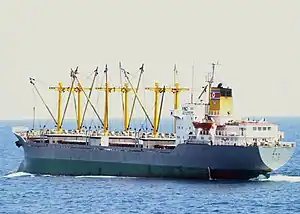| Dai Hong Dan incident | |||
|---|---|---|---|
 Dai Hong Dan underway in 2007 | |||
| Date | 29 October 2007 | ||
| Location | Indian Ocean, off the coast of Mogadishu | ||
| Resulted in | Sailors regain control of the ship | ||
| Parties | |||
| |||
| Number | |||
| |||
| Casualties and losses | |||
| |||
The Dai Hong Dan incident took place on 29 October 2007, when the North Korean cargo vessel MV Dai Hong Dan (대홍단호) was attacked and temporarily seized by Somali pirates off Somalia.[1] The following day, the crew of the vessel overpowered the pirates with the support of a US naval vessel.[2][3][4]
Seizure
The incident took place about 70 miles (110 km) northeast of the Somali capital, Mogadishu. A group of Somali pirates boarded and captured the North Korean cargo ship Dai Hong Dan, originally launched at Chongjin in 1978. According to North Korean sources, the ship had unloaded its cargo in the Somali capital when seven armed pirates (disguised as guards) boarded the ship, detaining the 22 sailors of the crew in the steering room and an engine room. They then forced the ship to sea and demanded a ransom of US$15,000.[1]
Revolt
The following day, responding to the vessel's distress signal, the US Navy guided missile destroyer USS James E. Williams approached the ship, and deployed an SH-60B helicopter and a VBSS (Visit, Board, Search, and Seizure) team to secure the scene.[4][5] Meanwhile, the North Korean sailors attacked their captors, seizing some weapons. The crew stormed the bridge and the engineering spaces, leaving one pirate dead in the action. A prolonged gunfight between the sailors and the pirates resulted in the pirates' defeat.
Two pirates[4] were killed in the engagement, and the other five were captured (three of whom were wounded). Of the six Korean sailors wounded, three required medical treatment, which was provided by American medical personnel.
Aftermath
The North Korean press (KCNA) released an unprecedented positive statement, expressing gratitude to the United States for their help,[6][7] and emphasizing the successful US–North Korean collaboration during the incident.[8][9]
See also
References
- 1 2 "Pirates 'overpowered' off Somalia". BBC News. 31 October 2007. Archived from the original on 26 August 2014. Retrieved 28 August 2014.
- ↑ "N. Korea Thanks U.S. for Piracy Aid". military.com. Associated Press (AP). 9 November 2007. Archived from the original on 13 September 2017. Retrieved 15 July 2017.
- ↑ Porth, Jacquelyn S. (1 November 2007). "U.S. Navy Still Battles Pirates on the High Seas". Bureau of International Information Programs. US Government. Archived from the original on 3 March 2016. Retrieved 15 July 2017.
- 1 2 3 "Crew wins deadly pirate battle off Somalia". CNN. 30 October 2007. Archived from the original on 18 October 2017. Retrieved 15 July 2017.
- ↑ "Pirates 'overpowered' off Somalia". BBC News. 31 October 2007. Archived from the original on 26 August 2014. Retrieved 28 August 2014.
- ↑ "North Korea offers rare thanks to U.S. for help". Reuters. Archived from the original on 19 August 2018. Retrieved 19 August 2018.
- ↑ "N. Korea thanks U.S. for helping its sailors in fight with Somali pirates". Denver Post. Archived from the original on 19 August 2018. Retrieved 19 August 2018.
- ↑ "DPRK's Consistent Principled Stand to Fight against All Forms of Terrorism Reiterated". kcna.co.jp. 11 November 2007. Archived from the original on 13 April 2015.
- ↑ Herman, Burt (8 November 2007). "NKorea Thanks US Over Piracy Standoff". AP News via The Washington Post. Archived from the original on 11 November 2018. Retrieved 27 January 2019.
